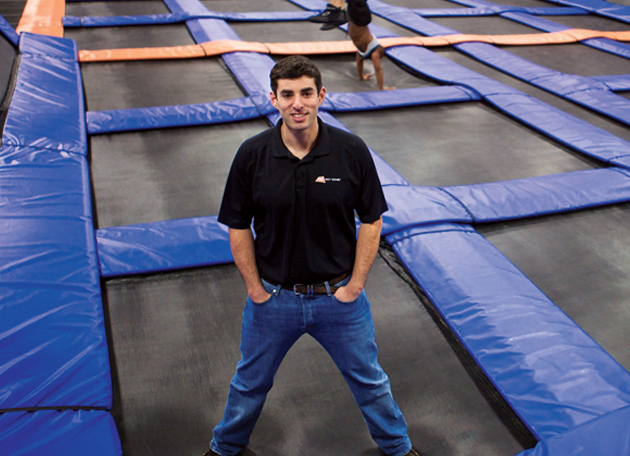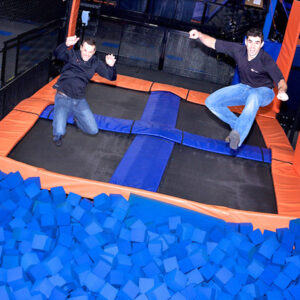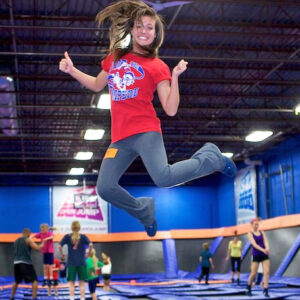
Twice a year college students take part in a compulsory routine: figuring out their next semester’s course schedule. For Jeff Platt, then a junior, the leaves on the trees had barely turned color before he was dreaming of spring — and all the fun it brings. So he went about assembling his second semester’s class schedule with the hope of a few easy A’s and some extra time for college amusement. What undergrad doesn’t favor such an ideal combination?
One class that piqued his interest was Ken Harrington’s “Entrepreneurship” course. Having worked two summers with his father on a new business venture in Las Vegas, Platt thought “Entrepreneurship” would fit nicely in his “work some–play some more” spring setup.
“I thought: ‘I know my business already, and most of the paperwork is done. So it would be an easy A for me,’” says Platt, AB ’06. “I had a couple of friends who planned to take the course with me, and we said: ‘Great — we’ve already got a business, and we don’t have much work to do!’”
As he started the class, however, Platt encountered the first of many twists. “As I learned more about entrepreneurship, I totally changed my thought processes,” he says. “I really got my mind focused on the business.”
The business — Sky Zone, an indoor trampoline park — at the time, had one budding location in Las Vegas. Platt’s father, Rick, and a silent partner had originally formed Sky Zone in 2002 with the idea of creating a new professional sport, one played in a trampoline court. After several years of struggling to get the idea off the ground, Sky Zone flipped objectives.
“We were fortunate that our research and development warehouse happened to be next door to a skate park,” Platt says.
One day in summer 2004 several skateboarders stopped by the facility, banged on the doors, and asked if they could jump on the trampolines. After a few months of rising interest, the Platts — knowing they needed to generate some income — decided to charge admission.
“Literally, within three months, we were averaging 10,000 jumpers a month,” Platt says, “and the concept just exploded.”
Bouncing back to St. Louis
As Platt further developed his business plan in the “Entrepreneurship” course, he received positive reinforcement from instructor Harrington, who is director of the university’s Skandalaris Center for Entrepreneurial Studies; classmates; as well as those in the St. Louis business community.
He heard time and again: “Jeff, you should try this. You need to do this in St. Louis.”
Platt knew, though, that actually starting a business would definitely turn his plan for the perfect student work–fun balance upside down. Yet, after some deliberation, he decided to take that giant leap.
In addition to his course work, Platt worked with investors to raise capital and with a broker to find an appropriate building site and secure a lease. During his senior year, he worked with architects, contractors and vendors for six months during the build-out of the facility. Then came the actual operations phase: hiring employees and marketing the park. Platt gained key exposure to each area of the business along the way, and he says that advice from mentors proved invaluable.
“I did not want to be that kid who just stepped into the business and suddenly was CEO,” Platt says. “I didn’t think that was my right. I wanted to learn the business from the ground up, and the way to do that was by starting out watching and helping a facility open.”
“I graduated in May ’06. On July 1, a little more than a month after graduation, we opened [in Chesterfield],” he says. “I was fortunate: I had a job right away. And, you know, it was my family business, but I did not want to be that kid who just stepped into the business and suddenly was CEO. I didn’t think that was my right. I wanted to learn the business from the ground up, and the way to do that was by starting out watching and helping a facility open.”
Sky Zone – St. Louis achieved stunning success in its first year, and Platt dreamed of possibly franchising and furthering the brand across the country.
“After seeing the success we had in our first year in St. Louis, I said: ‘This is easy. There should be no problems raising money, no problems to expand quickly. Who wouldn’t want to be involved in this business?’”
He quickly learned that to franchise a business successfully some key elements must be in place. “You must have a great product, but it also must be a viable business over a 20-year period,” Platt says. “And you must execute your business properly.”
Platt admits, too, that his biggest surprise was realizing the amount of time, energy and focus needed to grow a brand, and to grow it in the right way.
Springboard to Sacramento and beyond
Diligence and hard work and a sound expansion strategy are paying off, however. The Sky Zone team, including another university alumnus, Matt Lambeth, AB ’06 — who handles all the new facility build-outs — opened a third location in Sacramento, Calif., two years later.
“We opened our facility in Sacramento in 2008. Then we started to get some national press, and, subsequently, the franchise requests started pouring in,” Platt says.
The Platts held off on franchising for a while, thinking the timing was not quite right and that they were not ready for expanding in such a big way.
“We didn’t want to be that company that had a fun concept, then opened as many franchises as possible, only to explode (in a negative way) two years later because we weren’t prepared for what we were getting into,” Platt emphasizes.
Now, three years after opening the Sacramento park, franchises exist in Boston; Columbus, Ohio; and Minneapolis. Locations in Buffalo, N.Y.; Cleveland; Atlanta; Orlando, Fla.; Memphis, Tenn.; Dallas, Houston and Austin, Texas; Tulsa, Okla.; Los Angeles; and Toronto, Ontario, are all in the planning phases and should be open by the end of the year, with the potential for more in the near future.
After the jump
“Parents come into our facilities and say: ‘Oh, I’m here to let my kids jump,’” Platt says. “And we always ask: ‘Why aren’t you jumping?’”
While opening new locations presents many challenges, they are not the only ones in running the business. Platt has learned that other challenges come with actually operating a site. For one, he believes that people will not keep coming back to a facility over a 10- to 20-year period just to jump for an hour. So, Platt says, it is up to Sky Zone’s management team and each site’s corps of workers to create fresh and exciting offerings for the public, such as corporate team-building opportunities, SkyRobics and 3-D dodgeball. Sky Zone also offers SkyMania — teen party nights —as well as children’s birthday parties.
Platt stresses strongly, however, that Sky Zone is not just for kids. Park managers encourage adults to participate, too. “Parents come into our facilities and say: ‘Oh, I’m here to let my kids jump,’” Platt says. “And we always ask: ‘Why aren’t you jumping?’”
For Platt, his life and business have been a series of jumps. This spring, he’s planning to come back to the Danforth Campus to celebrate his fifth Reunion. With old friends, he’ll be able to share that he’s still dealing with the whole work–play dynamic — and with great results!
For more information, visit Sky Zone.
Terri Nappier is editor of this magazine.



Comments and respectful dialogue are encouraged, but content will be moderated. Please, no personal attacks, obscenity or profanity, selling of commercial products, or endorsements of political candidates or positions. We reserve the right to remove any inappropriate comments. We also cannot address individual medical concerns or provide medical advice in this forum.